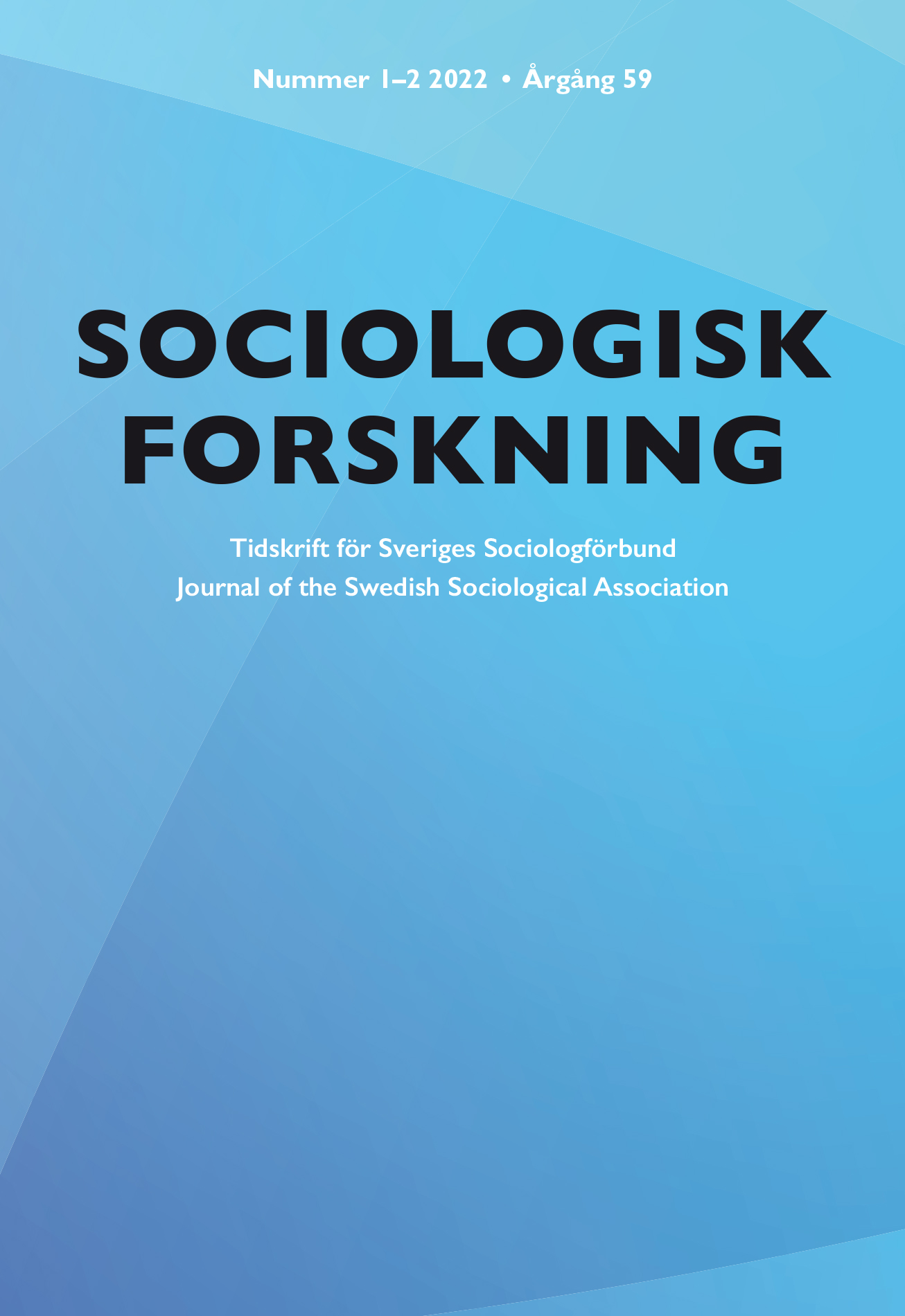Collective forms of altruism
On Durkheim’s “vocational heroes”
DOI:
https://doi.org/10.37062/sf.59.23430Keywords:
altruism, Durkheim, heroic altruism, civic altruism, critical linksAbstract
The present article applies Émile Durkheim’s perspective on altruism as a collective phenomenon in today’s working life. By so doing, the article re-actualizes the classic sociological problem of how altruism and working life can be reconciled. Auguste Comte and Herbert Spencer laid the foundation for two competing solutions to that question: moral regulations versus altruistic competition. Based on Durkheim’s thinking, two overlooked collective forms of altruism are elaborated: civic altruism (professional etic and civic morals) and heroic altruism (ancient virtues and military spirit). These forms of self-sacrificing altruism are relevant to the changing ideals and conditions of working life. Vertical differentiation is another factor that matters in producing altruistic heroes, such as the cosmopolitical hero, the local patriotic hero, the brave or immoral citizen in emergencies.
References
Alberto Diaz, J. (1995) ”’Flyktingvännerna’ – altruism, attitydkonsistens och sociala profil”, Sociologisk Forskning 32 (1):56–73. https://doi.org/10.37062/sf.32.18580
Allyn Piliavin, J. & H.-W. Chargn (1990) ”Altruism. A review of recent theory and research”, Annual Review of Sociology 16:27–65. https://doi.org/10.1146/annurev.so.16.080190.000331
Bauman, Z. (1996[1993]) Postmodern etik. Göteborg: Daidalos.
Bauman, Z. (2018[2017]) Retrotopia. Göteborg: Daidalos.
Beck, U. & E. Beck-Gernsheim (2002) Individualization. Institutionalized individualism and its social and political consequences. London: Sage. https://dx.doi.org/10.4135/9781446218693
Boglind, A., S. Eliӕson, & P. Månsson (2000) Kapital, rationalitet och social sammanhållning. En introduktion till klassisk samhällsteori. Stockholm: Rabén Prisma.
Chinmayee, M. & R. Navaneeta (2020) ”Social solidarity during a pandemic. Through and beyond Durkheimian lens”, Social Sciences & Humanities Open 2 (1):1–7. https://doi.org/10.1016/j.ssaho.2020.100079
Comte, A. (1973[1851]) System of positive polity, volume 1. Containing the general view of positivism and introductory principles. New York: Burt Franklin.
Desmond, M. (2006) ”Becoming a firefighter”, Ethnography 7 (4):387–421. https://doi.org/10.1177/1466138106073142
De Waal, F. (2019) The age of empathy. Nature’s lesson for a kinder society. Croydon: Souvenir Press.
Durkheim, É. (1958[1928]) Socialism and Saint-Simon. London: Routledge. https://doi.org/10.4324/9780203092811
Durkheim, É. (1979) Essays on morals and education. London: Routledge.
Durkheim, É. (1956) Education and sociology. Glencoe: Free Press.
Durkheim, É. (1983[1897]) Självmordet. Lund: Argos.
Durkheim, É. (1984[1893]) The division of labor in society. London: McMillan.
Durkheim, É. (2008[1912]) The elementary forms of religious life. Oxford: Oxford University Press.
Durkheim, É. (2013[1950]) Professional ethics and civic morals. Glencoe: The Free Press.
Giddens, A. (1997) Durkheim. London: Fontana Press.
Hobbes, T. (2004[1651]) Leviathan. Göteborg: Daidalos.
Jørgensen, C.H, O.J. Olsen & D. Persson Thunqvist (red.) (2018) Vocational education in the Nordic countries. Learning from diversity. Abington: Routledge. https://doi.org/10.4324/9781315414492
Kohen, A., M. Langdon & G. Riches (2019) ”The making of a hero. Cultivating empathy, altruism, and heroic imagination”, Journal of Humanistic Psychology 59 (4):617–633. https://doi.org/10.1177/0022167817708064
MacAskill, W. (2015) Doing good better. Effective altruism and a radical way to make a difference. London: Guardian Faber.
Matthewman, S. & K. Huppatz (2020) ”A sociology of Covid-19”, Journal of Sociology 56 (4):675–683. https://doi.org/10.1177/1440783320939416
Parsons, T. (1964[1939]) Essays in sociological theory. New York: The Free Press.
Persson Thunqvist, D. & M. Gustavsson (2021) ”Lokala industriers betydelse för yrkesutbildningen på orten”, Arbetsmarknad & Arbetsliv 27 (1):26–46.
Persson Thunqvist, D. & A. Hallqvist (2020) ”Kan högre utbildning lyfta yrkesgymnasiet?”, 127–158 i A. Panican (red.) Yrkesutbildning på undantag? Att bryta den låga attraktionskraften. Lund: Studentlitteratur.
Reimer, J.W. (1998) ”Durkheim’s ’heroic suicide’ in combat”, Armed Forces & Society 25 (1):103–120. https://doi.org/10.1177/0095327X9802500106
Sennett, R. (2007[2006]) Den nya kapitalismens kultur. Stockholm: Atlas.
Slettmyr, A., A. Schandl & M. Arman (2019) ”The ambiguity of altruism in nursing. A qualitative study”, Nursing Ethics 26 (2):368–377. https://doi.org/10.1177/0969733017709336
Stedman Jones, S. (2001) Durkheim reconsidered. Oxford: Polity Press.
Steiner, P. (2017) ”Religion and the sociological critique of political economy. Altruism and gift”, European Journal of the History of Economic Thought 24 (4):876–906. https://doi.org/10.1080/09672567.2017.1332664
Spencer, H. (1900[1879]) The data of ethics. New York: Collier.
Tomasello, M. (2019) Becoming human. A theory of ontogeny. Cambridge: Harvard University Press.
van der Wath, A. & N. van Wyk (2020) ”A hermeneutic literature review to conceptualise altruism as a value in nursing”, Scandinavian Journal of Caring Sciences 34 (3):575–584. https://doi.org/10.1111/scs.12771
Åhlfeldt, E. (2017) Hållbart utvecklingsarbete i vård och omsorg. Ett institutionellt perspektiv på projekt i en professionell och byråkratisk kontext. Linköping: Linköpings universitet.
Downloads
Published
How to Cite
Issue
Section
License
Copyright (c) 2022 Author

This work is licensed under a Creative Commons Attribution-NonCommercial-NoDerivatives 4.0 International License.
All content in Sociologisk Forskning is published with immediate open access, under the Creative Commons license CC BY-NC-ND 4.0.
All content may be read, downloaded, shared and printed for non-commercial purposes, free and without fees. Contents may not be altered. When content is reused, author, source and a link to the copyright licence must be provided. The author retains copyright to their content. No publication fees are charged.





